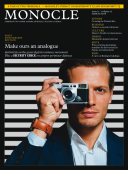
Issue 11
Make ours an analogue: Monocle on the great digital resistance movement. Plus a security check on airport perimeter defences.
In This Issue
Oops! No content was found.
Looks like we no longer have content for the page you're on. Perhaps try a search?
Return Home

